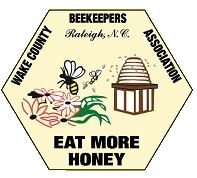Are you going to the NCSBA Spring Conference in New Bern? Do you want to go, but have never gone before?
We are collecting RSVP's for those attending the conference so we can make sure first time attendees have help in making the conference work for them. Plus, we meet as a club on Thursday evening for dinner together, and we meet for a group photo. So, we need you to RSVP on this event to let us know you are attending.
REGISTERING FOR THIS CLUB CALENDAR EVENT DOES NOT REGISTER YOU FOR THE CONFERENCE.
To register, visit NC BEEKEEPERS for more info.
Scheduled to speak
 Ross Conrad of Middlebury, Vermont learned his craft from the late Charles Mraz, world renowned beekeeper and promoter of apitherapy along with his son Bill. Conrad is a former president of the Vermont Beekeeper’s Association, a regular contributor to Bee Culture magazine, author of Natural Beekeeping: Organic Approaches to Modern Apiculture Expanded and Revised 2nd Edition, and co-author of The Land of Milk and Honey: A History of Beekeeping in Vermont. Ross has given bee related presentations and led organic beekeeping workshops and classes throughout North America for three decades. His beekeeping business, Dancing Bee Gardens, supplies friends, neighbors with honey and candles among other bee related products, has 5-frame nucleus bee colonies available each June, and provides bees for Vermont pollination in spring.
Ross Conrad of Middlebury, Vermont learned his craft from the late Charles Mraz, world renowned beekeeper and promoter of apitherapy along with his son Bill. Conrad is a former president of the Vermont Beekeeper’s Association, a regular contributor to Bee Culture magazine, author of Natural Beekeeping: Organic Approaches to Modern Apiculture Expanded and Revised 2nd Edition, and co-author of The Land of Milk and Honey: A History of Beekeeping in Vermont. Ross has given bee related presentations and led organic beekeeping workshops and classes throughout North America for three decades. His beekeeping business, Dancing Bee Gardens, supplies friends, neighbors with honey and candles among other bee related products, has 5-frame nucleus bee colonies available each June, and provides bees for Vermont pollination in spring.
 Hilary Kearney is the author of QueenSpotting and the creator of Girl Next Door Honey, a beekeeping business that offers educational opportunities to hundreds of new beekeepers each year. She maintains the blog Beekeeping Like A Girl and her writing on bees has appeared in Modern Farmer and Grit magazines. Her work has been the subject of features in Huffington Post, Vogue, Mother Earth News, and other outlets. She rescues wild bee colonies, teaches new beekeepers, and manages around forty small urban apiaries in her hometown of San Diego, California. Her new book, Heart of the Hive focuses on honey bee behavior.
Hilary Kearney is the author of QueenSpotting and the creator of Girl Next Door Honey, a beekeeping business that offers educational opportunities to hundreds of new beekeepers each year. She maintains the blog Beekeeping Like A Girl and her writing on bees has appeared in Modern Farmer and Grit magazines. Her work has been the subject of features in Huffington Post, Vogue, Mother Earth News, and other outlets. She rescues wild bee colonies, teaches new beekeepers, and manages around forty small urban apiaries in her hometown of San Diego, California. Her new book, Heart of the Hive focuses on honey bee behavior.
 Angelina Perrotti, Ph.D., is the founder of Mellifloral, a honey pollen analysis service for beekeepers across North America. With more than 10 years of experience with honey pollen, she has analyzed samples from over thirty states. Perrotti is also a Research Scientist at the University of Wisconsin-Madison and works closely with entomology labs nationwide to advance research on biodiversity and honey pollen analysis.
Angelina Perrotti, Ph.D., is the founder of Mellifloral, a honey pollen analysis service for beekeepers across North America. With more than 10 years of experience with honey pollen, she has analyzed samples from over thirty states. Perrotti is also a Research Scientist at the University of Wisconsin-Madison and works closely with entomology labs nationwide to advance research on biodiversity and honey pollen analysis.

Phoebe Snyder has been dedicated to beekeeping since opening her first hive in 2015. Snyder holds a B.S. in Biology from Stevenson University and an M.S. in Biology from UNC Greensboro, where she conducted both lab and field research across the U.S. and abroad. Over the years, Snyder has worked with several startups in the beekeeping industry and founded her own company, where she co-developed and launched a novel selective breeding test for honey bees. In addition to managing her own apiary, she currently serves as an adjunct professor of beekeeping at Guilford College, the U.S. Sales Representative for NOD Apiary Products, and the Research Program Manager for The Best Bees Company.

